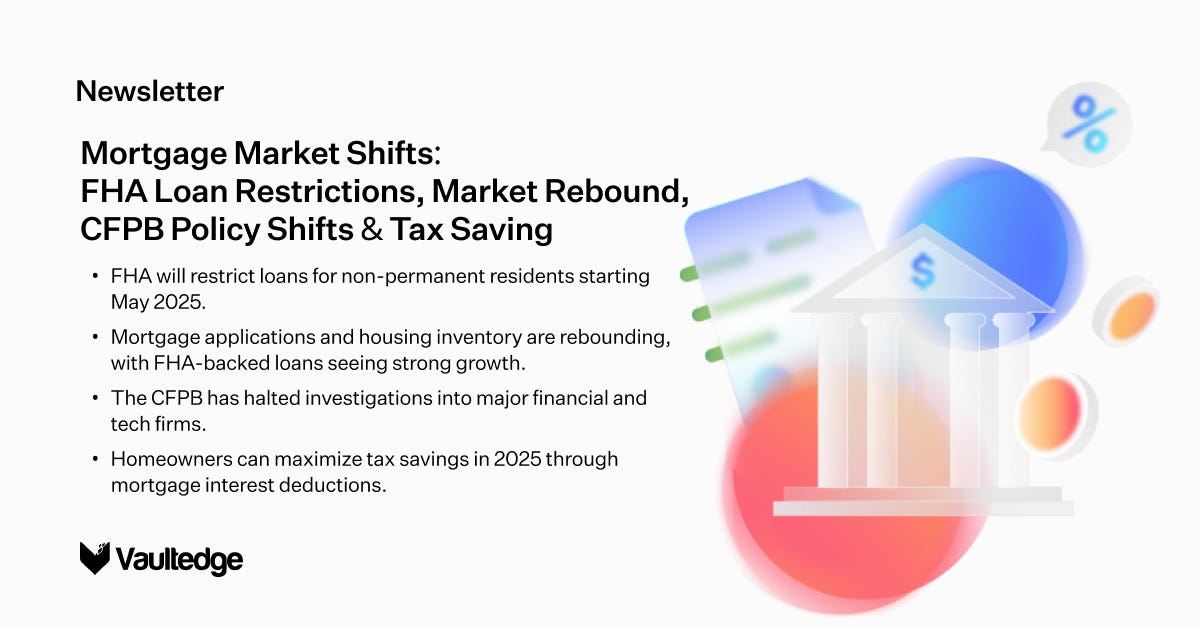Mortgage Market Shifts: FHA Loan Restrictions, Market Rebound, CFPB Policy Shifts and Tax Savings in 2025
Your Weekly Briefing on FHA Loan Restrictions Housing Market Trends CFPB Policy Shifts and Mortgage Tax Benefits for 2025
Here’s a complete low-down 👇
Before you move on …
We would love, if you could subscribe to our newsletter.
FHA to Restrict Loans for Non-Permanent Residents Starting May 2025
The U.S. Department of Housing and Urban Development (HUD) has announced a policy change barring non-permanent U.S. residents from obtaining mortgages insured by the Federal Housing Administration (FHA). Effective May 25, 2025, this move aligns with the Trump Administration’s stance on reserving federal benefits for U.S. citizens and lawful permanent residents. HUD cited concerns over immigration status affecting long-term financial stability as a key reason for this decision.
Under the new guidelines, mortgage lenders must verify a borrower’s residency status before approving FHA-insured loans. A Social Security card alone will not be considered sufficient proof of work or immigration status. Eligible borrowers include U.S. citizens, lawful permanent residents, and select citizens of Micronesia, the Marshall Islands, and Palau who meet FHA financing criteria. Non-permanent residents who wish to secure an FHA-insured loan must complete the process before May 24, 2025.
For lenders, this policy shift adds an extra layer of responsibility in assessing borrower eligibility. Those affected will need to explore alternative mortgage options, such as conventional loans, which often have stricter requirements. As the deadline approaches, both borrowers and lenders must act swiftly to ensure compliance with the new FHA policy….Read More.
Buyer Interest and Housing Inventory Rebound in the Mortgage Market
Mortgage lenders are witnessing a resurgence in both housing inventory and buyer interest, signaling a potential revitalization of the real estate market. The Mortgage Bankers Association (MBA) reports that mortgage purchase applications have increased for the second consecutive week, with a 0.7% uptick following a previous 0.1% rise. Year-over-year, the Purchase Index has grown by 6.9%, indicating sustained demand despite relatively stable mortgage rates.
Joel Kan, MBA's Vice President and Deputy Chief Economist, noted that purchase applications are at their strongest weekly pace in nearly two months. This growth is particularly evident in government-backed loans, with Federal Housing Administration (FHA) mortgage applications rising by 5.7% weekly. The increase suggests that buyers, especially those utilizing FHA loans, are finding more opportunities as housing inventory gradually improves.
The uptick in available listings, combined with mortgage rates stabilizing around 6.71%, is encouraging more homeowners to enter the market. Mark Fleming, Chief Economist at First American, anticipates that as existing homeowners adjust to the current mortgage rate environment and list their properties, the increased supply will help moderate price appreciation, further stimulating buyer interest.…. Read More.
CFPB Pulls Back on Big Tech and Finance Probes Under Trump
Under the Trump administration, the Consumer Financial Protection Bureau (CFPB) has halted numerous investigations into major financial firms and tech companies, raising concerns about consumer protection. Lawsuits against industry giants like Capital One and Rocket Homes have been dropped, while ongoing probes into companies such as Meta, Carvana, and Greenlight Financial Technology have stalled. Consumer advocates warn that these actions could shield corporations from accountability and weaken regulatory oversight, leaving consumers vulnerable to harmful business practices.
The CFPB’s shift in enforcement aligns with broader efforts by the administration to limit regulatory intervention. A stop-work order has effectively frozen investigations into companies suspected of financial misconduct, including those previously penalized for consumer violations. Even high-profile cases, such as allegations that Meta improperly stored financial data from loan applications, have been put on hold. Critics argue that the agency’s inaction sends a signal that financial misconduct may go unchecked, undermining consumer rights and protections.
This regulatory pullback benefits corporations while raising ethical and legal concerns. With CFPB staff unable to proceed with enforcement actions, the agency risks becoming ineffective in its mission. As legal battles unfold, the future of consumer protection in the U.S. remains uncertain, with the potential for long-term repercussions on financial transparency and corporate accountability….. Read More.
Unlock Tax Savings with Mortgage Interest Deduction in 2025
With tax season approaching, homeowners often wonder if mortgage interest is tax-deductible. The answer is yes—but only if you itemize deductions. The mortgage interest deduction allows homeowners to reduce taxable income by deducting the interest paid on loans up to $750,000 for primary or secondary residences. However, with the higher standard deduction, fewer taxpayers benefit from itemizing.
To claim this deduction, you must file Schedule A (Form 1040) and ensure your total itemized deductions exceed the standard deduction. With rising mortgage rates, more homeowners may find itemizing beneficial. Mortgage interest on home equity loans, second mortgages, and refinances may also qualify—provided the funds were used for home improvements. Points paid on new loans or refinances could be deductible, but additional IRS criteria apply.
If your mortgage interest deduction doesn’t exceed the standard deduction, taking the latter may be the better option. Always compare both methods and consult a tax professional if needed. Keeping track of Form 1098 from your lender will help streamline the filing process. With careful tax planning, you can maximize savings and lower your taxable income…. Read More
That’s a wrap for this week’s issue. Stay updated on mortgage policies, market shifts, and financial regulations. Get expert insights, detailed analysis, and key updates straight to your inbox. Subscribe now to stay informed and make smarter financial decisions.




